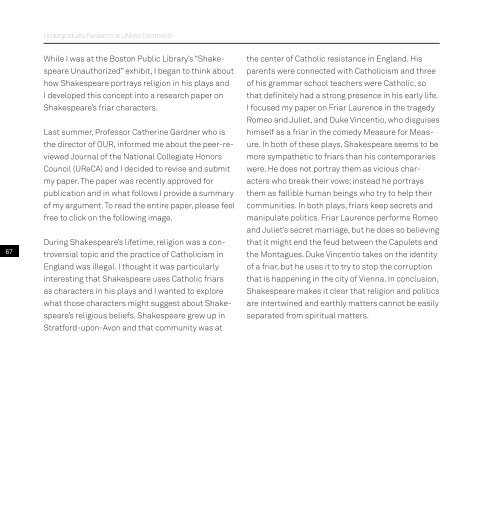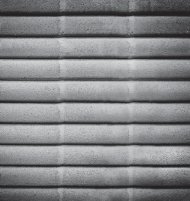Undergrad_Book_16-18_Pge_View_Print_no print marks_compressed
You also want an ePaper? Increase the reach of your titles
YUMPU automatically turns print PDFs into web optimized ePapers that Google loves.
<strong>Undergrad</strong>uate Research at UMass Dartmouth<br />
67<br />
While I was at the Boston Public Library’s “Shakespeare<br />
Unauthorized” exhibit, I began to think about<br />
how Shakespeare portrays religion in his plays and<br />
I developed this concept into a research paper on<br />
Shakespeare’s friar characters.<br />
Last summer, Professor Catherine Gardner who is<br />
the director of OUR, informed me about the peer-reviewed<br />
Journal of the National Collegiate Ho<strong>no</strong>rs<br />
Council (UReCA) and I decided to revise and submit<br />
my paper. The paper was recently approved for<br />
publication and in what follows I provide a summary<br />
of my argument. To read the entire paper, please feel<br />
free to click on the following image.<br />
During Shakespeare’s lifetime, religion was a controversial<br />
topic and the practice of Catholicism in<br />
England was illegal. I thought it was particularly<br />
interesting that Shakespeare uses Catholic friars<br />
as characters in his plays and I wanted to explore<br />
what those characters might suggest about Shakespeare’s<br />
religious beliefs. Shakespeare grew up in<br />
Stratford-upon-Avon and that community was at<br />
the center of Catholic resistance in England. His<br />
parents were connected with Catholicism and three<br />
of his grammar school teachers were Catholic, so<br />
that definitely had a strong presence in his early life.<br />
I focused my paper on Friar Laurence in the tragedy<br />
Romeo and Juliet, and Duke Vincentio, who disguises<br />
himself as a friar in the comedy Measure for Measure.<br />
In both of these plays, Shakespeare seems to be<br />
more sympathetic to friars than his contemporaries<br />
were. He does <strong>no</strong>t portray them as vicious characters<br />
who break their vows; instead he portrays<br />
them as fallible human beings who try to help their<br />
communities. In both plays, friars keep secrets and<br />
manipulate politics. Friar Laurence performs Romeo<br />
and Juliet’s secret marriage, but he does so believing<br />
that it might end the feud between the Capulets and<br />
the Montagues. Duke Vincentio takes on the identity<br />
of a friar, but he uses it to try to stop the corruption<br />
that is happening in the city of Vienna. In conclusion,<br />
Shakespeare makes it clear that religion and politics<br />
are intertwined and earthly matters can<strong>no</strong>t be easily<br />
separated from spiritual matters.



